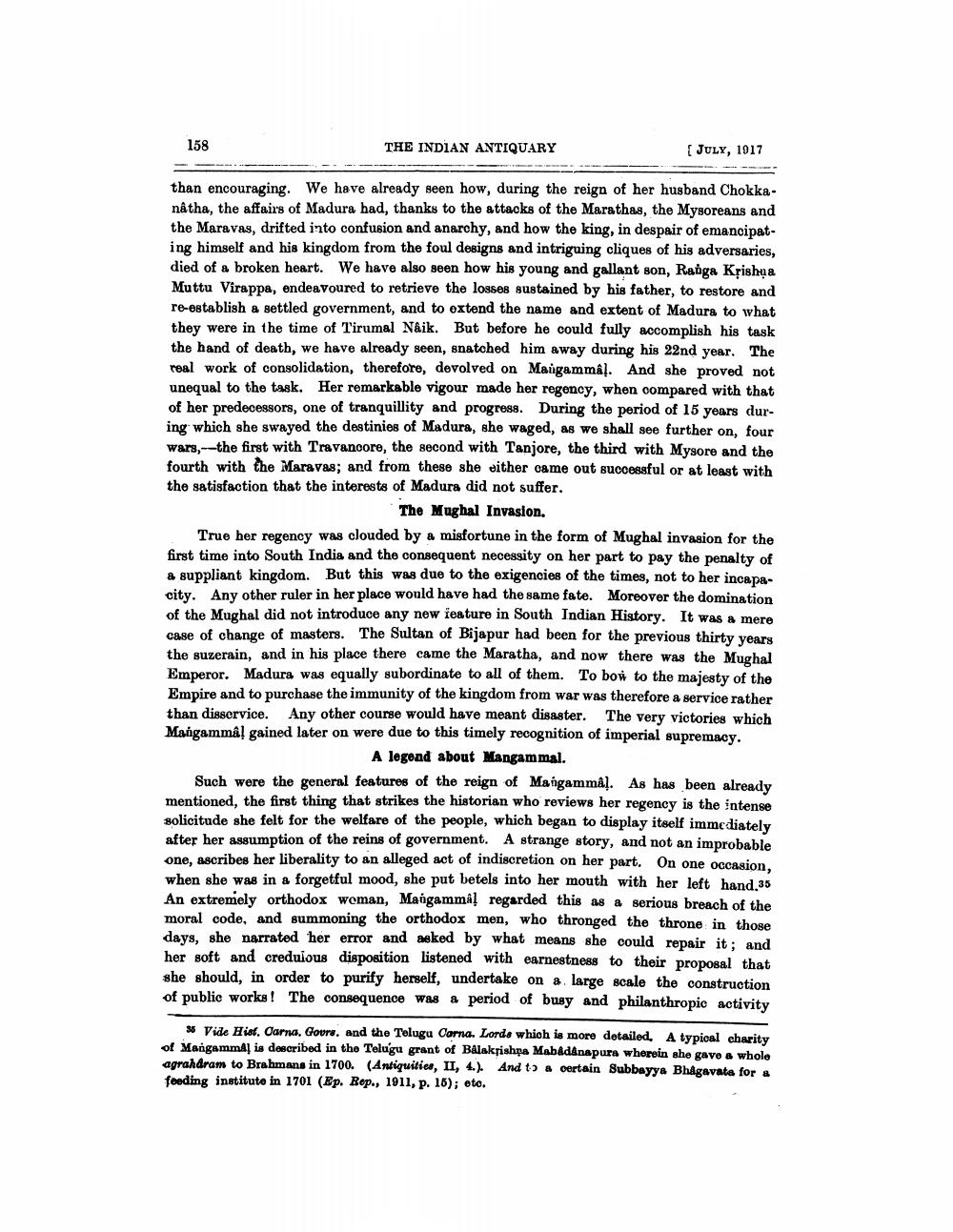________________
158
THE INDIAN ANTIQUARY
{ JULY, 1917
than encouraging. We have already seen how, during the reign of her husband Chokkanåtha, the affairs of Madura had, thanks to the attacks of the Marathas, the Mysoreans and the Maravas, drifted into confusion and anarchy, and how the king, in despair of emancipating himself and his kingdom from the foul designs and intriguing cliques of his adversaries, died of a broken heart. We have also seen how his young and gallant son, Ranga Krishựa Muttu Virappa, endeavoured to retrieve the losses sustained by his father, to restore and re-establish a settled government, and to extend the name and extent of Madura to what they were in the time of Tirumal N&ik. But before he could fully accomplish his task the hand of death, we have already seen, snatched him away during his 22nd year. The real work of consolidation, therefore, devolved on Maugammal. And she proved not unequal to the task. Her remarkable vigour made her regency, when compared with that of her predecessors, one of tranquillity and progress. During the period of 15 years during which she swayed the destinies of Madura, she waged, as we shall see further on, four wars--the first with Travanoore, the second with Tanjore, the third with Mysore and the fourth with the Maravas; and from these she either came out successful or at least with the satisfaction that the interests of Madura did not suffer.
The Mughal Invasion. True her regency was clouded by a misfortune in the form of Mughal invasion for the first time into South India and the consequent necessity on her part to pay the penalty of a suppliant kingdom. But this was due to the exigencies of the times, not to her incapacity. Any other ruler in her place would have had the same fate. Moreover the domination of the Mughal did not introduce any new feature in South Indian History. It was a mere case of change of masters. The Sultan of Bijapur had been for the previous thirty years the suzerain, and in his place there came the Maratha, and now there was the Mughal Emperor. Madura was equally subordinate to all of them. To box to the majesty of the Empire and to purchase the immunity of the kingdom from war was therefore a service rather than disservice. Any other course would have meant disaster. The very victories which Mangammal gained later on were due to this timely recognition of imperial supremacy.
A legend about Mangammal. Such were the general features of the reign of Mangammal. As has been already mentioned, the first thing that strikes the historian who reviews her regency is the intense solicitude she felt for the welfare of the people, which began to display itself immediately after her assumption of the reins of government. A strange story, and not an improbable one, ascribes her liberality to an alleged act of indiscretion on her part. On one occasion. when she was in a forgetful mood, she put betels into her mouth with her left hand. 35 An extremely orthodox woman, Mangammal regarded this as a serious breach of the moral code, and summoning the orthodox men, who thronged the throne in those days, she narrated her error and asked by what means she could repair it; and her soft and credulous disposition listened with earnestness to their proposal that she should, in order to purify herself, undertake on a large scale the construction of public works! The consequence was a period of busy and philanthropic activity
38 Vide Hial. Oarna, Gours, and the Telugu Carna. Lords which is more detailed. A typioal charity of Magammal is described in the Telugu grant of Balakrishpa Mabadanapura wherein she gave a whole agrahdram to Brahmans in 1700. (Antiquities, II, 4.). And to a certain Subbayya Bhagavata for a fooding institute in 1701 (Ep. Rep., 1911, p. 16); etc.




